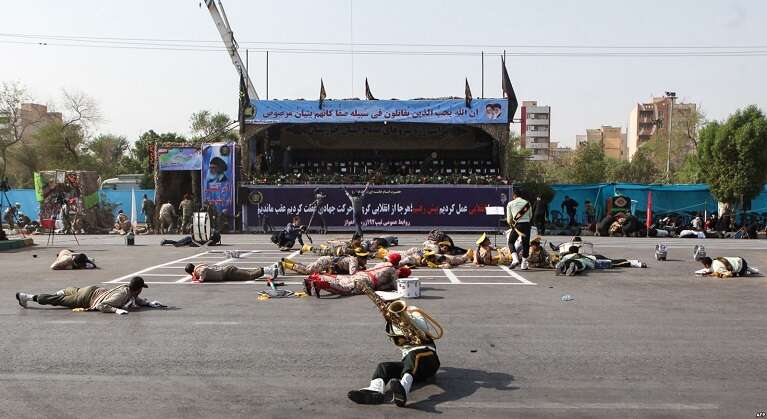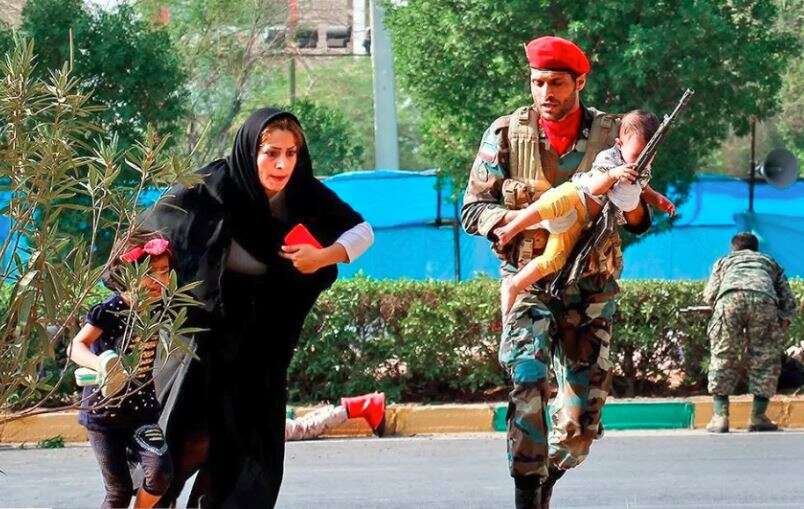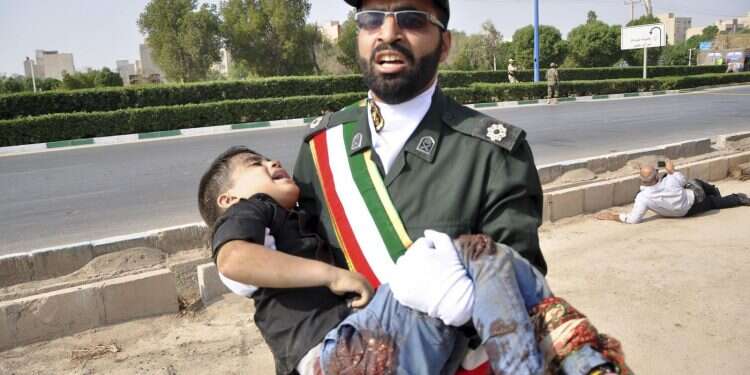Iranian President Hassan Rouhani on Saturday blamed Israel, the United States and regional archenemy Saudi Arabia for the deadly terrorist attack that left at least 25 dead and 60 wounded in the southwestern city of Ahvaz in Khuzestan, a province bordering Iraq, and vowed a "crushing" response to the shooting.
The attack, which took place during a military parade marking the 30th anniversary of the 1980-1988 Iran-Iraq war, saw four gunmen disguised as soldiers open fire on a crowd of marching Revolutionary Guard soldiers, bystanders and government officials watching from a nearby riser.
Among the dead and wounded were a journalist, civilians – including women and children – and military personnel, the state-run IRNA news agency reported as the chaos was captured live on state television.
Two groups – the Islamic State group and the anti-government Al-Ahvaziya, or Arab Struggle Movement to Liberate Ahvaz group – claimed responsibility for the shooting.
Iranian Armed Forces spokesman Brig. Gen. Abolfazl Shekarchi said the four had hidden weapons near the parade route several days in advance.
"All four terrorists were quickly neutralized by security forces," he said.

Shekarchi further alleged that the four terrorists "were dependent on the intelligence services of the U.S. and the Mossad," Israel's national intelligence agency, adding they were "trained and organized in two Persian Gulf countries."
He offered no proof for his allegations.
Attack perpetrated by 'U.S.'s puppets'
Rouhani has ordered Iran's Intelligence Ministry to investigate the attack.
"The president stressed that the response of the Islamic Republic of Iran to the slightest threat would be crushing, and those who support the terrorists will be held accountable," his office said in a statement.
Speaking before leaving Tehran to attend the U.N. General Assembly in New York, Rouhani said that the U.S. seeks to create chaos and insecurity in Iran. He also accused U.S.-backed Gulf Arab states of providing financial and military support for anti-government ethnic Arab groups.
"The small puppet countries in the region are backed by America, and the United States is provoking them and giving them the necessary capabilities.
Iran's answer is forthcoming within the framework of law and our national interests," said Rouhani, adding that the United States will regret its "aggressiveness."

Iran's Supreme Leader Ayatollah Ali Khamenei described the attack as exposing "the atrocity and viciousness of the enemies of the Iranian nation."
"Their crime is a continuation of the conspiracies by the U.S.-backed regimes in the region which have aimed at creating insecurity in our dear country. However, to their dismay, the Iranian nation will persist on the noble and prideful path they have taken and will – like before – overcome all animosities," he said.
Khamenei accused U.S.-backed Gulf Arab states of carrying out the shooting and ordered security forces to bring to justice those responsible for one of the worst assaults ever against the Revolutionary Guards, the most powerful military force in the country, which answers directly to him.
The allegation will likely ratchet up tensions with Iran's rival Saudi Arabia and its Gulf allies, which along with the United States have been working to isolate the Islamic republic.
"This crime is a continuation of the plots of the regional states that are puppets of the United States," Khamenei said, without naming the nations he believed were to blame.
Initially, Iranian authorities described the terrorists as "takfiri gunmen," a term previously used to describe Islamic State operatives, but later, state media and government officials seemed to come to the consensus that Arab separatists in the region were responsible.
The separatists accuse Iran's government of discriminating against its ethnic Arab minority, though an Ahvazi Arab, Gen. Ali Shamkhani, serves as the secretary of Iran's Supreme National Security Council.

Iranian Foreign Minister Mohammad Javad Zarif said the Islamic republic will respond "swiftly and decisively" to the deadly attack.
"Terrorists recruited, trained, armed and paid by a foreign regime have attacked Ahvaz," he tweeted. "Iran will respond swiftly and decisively in defense of Iranian lives."
While Zarif did not name the regimes to which he referred, shortly after the attack, the Iranian Foreign Ministry summoned diplomats from Denmark, the Netherlands and Britain for a reprimand.
The Dutch and Danish ambassadors and the British charge d'affaires were "informed of Iran's strong protests over their respective countries' hosting of some members of the terrorist group" that carried out the attack, IRNA reported.
Citing Foreign Ministry spokesman Bahram Qasemi, the report said Tehran called on Denmark and the Netherlands "to extradite the attack's "masterminds and their accomplices" to stand trial in Iran.
"It is not acceptable that the European Union does not blacklist members of these terrorist groups as long as they do not perpetrate a crime on European soil," Qasemi was quoted as saying.
The British charge d'affaires, summoned in the ambassador's absence, was told it was unacceptable "that the spokesman for the terrorist group was allowed to claim responsibility of the attack through a London-based TV network."
Shortly after the attack, a Saudi-linked, Farsi-language satellite channel based in the U.K. aired an interview with Al-Ahvaziya spokesman Yacoub Hor al-Tostari, who said the shooting was the work of his organization.
The attack "undermined the Iranian government on the day it wants to give a message to the world that it is powerful and in control," al-Tostari said.
Iranian Ambassador to the U.K. Hamid Baeidinejad called the channel's decision to air the interview a "heinous act" and said Iran would file a complaint with British authorities over the broadcast.
U.N., U.S. condemn attack
American and United Nations officials condemned the attack Saturday.
"The United States condemns all acts of terrorism and the loss of any innocent lives," State Department spokeswoman Heather Nauert said in a statement.
"We stand with the Iranian people against the scourge of radical Islamic terrorism and express our sympathy to them at this terrible time," she said.
United Nations Secretary General Antonio Guterres issued a statement saying the world body "condemns the attack today in Iran's southwestern city of Ahvaz."
The statement said Guterres "expresses his condolences to the families of the victims and to the government and people of Iran, and wishes the injured a speedy recovery."
Russian President Vladimir Putin also offered his condolences over the attack, saying Moscow was ready to boost joint efforts in the fight against terrorism.
Egypt, a key ally of Saudi Arabia, also condemned the attack.

